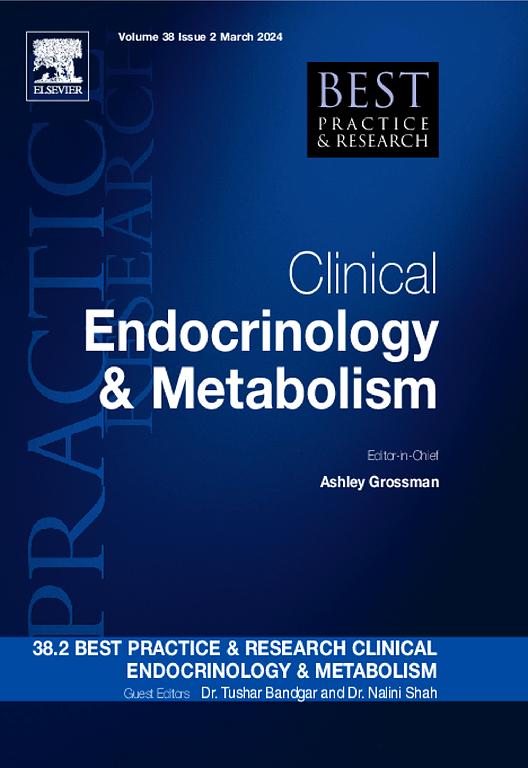颅咽管瘤患者的代谢并发症及其机制。
IF 6.1
1区 医学
Q1 ENDOCRINOLOGY & METABOLISM
Best practice & research. Clinical endocrinology & metabolism
Pub Date : 2025-09-01
DOI:10.1016/j.beem.2025.101999
引用次数: 0
摘要
在颅咽管瘤确诊后,由于疾病和/或治疗相关的下丘脑病变,患者经常出现体重迅速增加,导致病态下丘脑肥胖。下丘脑肥胖应在下丘脑综合征的背景下诊断和治疗。下丘脑综合征包括神经内分泌缺陷、昼夜节律紊乱、饥饿-饱足感和口渴感紊乱、体温失调以及神经认知、睡眠和社会心理行为问题。代谢综合征、心血管问题、与健康有关的生活质量严重受损和过早死亡的风险增加,往往会损害长期预后。下丘脑综合征的治疗具有挑战性。最近,一种针对下丘脑综合征的个性化、风险特异性治疗算法已经发表。右旋安非他明和其他中枢刺激剂以及胰高血糖素样肽-1受体(GLP-1R)激动剂可能导致体重减轻。减肥手术是有效的。然而,由于对未成年人的道德和法律考虑,不可逆转的手术存在争议。保留下丘脑的治疗策略和研究新的下丘脑综合征治疗剂是必要的。本文章由计算机程序翻译,如有差异,请以英文原文为准。
Metabolic complications and their mechanisms in patients with craniopharyngioma
After diagnosis of craniopharyngioma, patients frequently develop a rapid weight gain leading to morbid hypothalamic obesity due to disease- and/or treatment-associated hypothalamic lesions. Hypothalamic obesity should be diagnosed and treated in the context of hypothalamic syndrome. Hypothalamic syndrome includes neuroendocrine deficiencies, disruption of circadian rhythm, disturbed hunger-satiety and thirst feelings, temperature dysregulation, and neurocognitive, sleep and psychosocial behavioral problems. Long-term prognosis is frequently impaired by increased risk for metabolic syndrome, cardiovascular problems, severe impairments of health-related quality of life, and premature mortality. Treatment of hypothalamic syndrome is challenging. Recently, an algorithm for personalized, risk-specific treatment of hypothalamic syndrome has been published. Dextro-amphetamines and other central stimulating agents as well as glucagon-like peptide-1 receptor (GLP-1R) agonists may cause weight loss. Bariatric surgery is effective. However, non-reversible procedures are controversial due to ethical and legal considerations in minors. Hypothalamus-sparing treatment strategies and research on novel therapeutic agents for hypothalamic syndrome are warranted.
求助全文
通过发布文献求助,成功后即可免费获取论文全文。
去求助
来源期刊
CiteScore
11.90
自引率
0.00%
发文量
77
审稿时长
6-12 weeks
期刊介绍:
Best Practice & Research Clinical Endocrinology & Metabolism is a serial publication that integrates the latest original research findings into evidence-based review articles. These articles aim to address key clinical issues related to diagnosis, treatment, and patient management.
Each issue adopts a problem-oriented approach, focusing on key questions and clearly outlining what is known while identifying areas for future research. Practical management strategies are described to facilitate application to individual patients. The series targets physicians in practice or training.

 求助内容:
求助内容: 应助结果提醒方式:
应助结果提醒方式:


